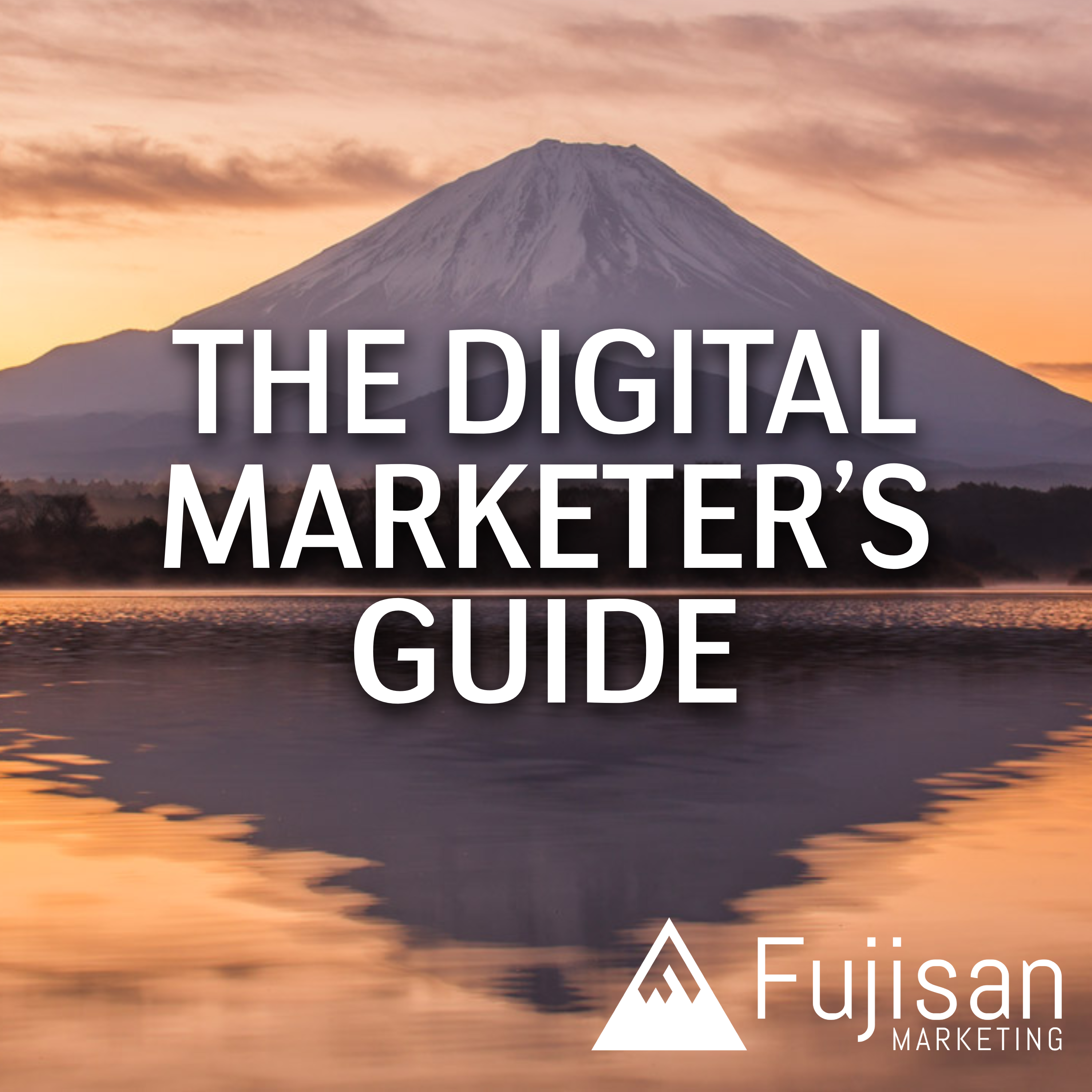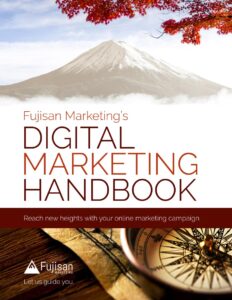PPC is a core tenant of a holistic digital marketing strategy, and it’s an important one. But setting up a PPC strategy isn’t a simple task. Understanding the client is a useful place to start, from getting to know their business and their current digital marketing program, but what else is involved? How do you build an effective PPC strategy from scratch? PPC expert Alec Hider joins us to share his years of wisdom on creating PPC strategies for clients.
Learn more about Fujisan Marketing here or email your questions/comments to contact@fujisanmarketing.com.
Full episode transcript:
Preston 00:15
Welcome to the digital marketer’s guide podcast where we break down digital marketing topics into bite sized episodes that can help make your marketing program and you a little better. I’m Preston Parshall, the founder and CEO Fujisan marketing. We’re here today with Alec Hider to discuss how to build an effective PPC strategy. Welcome to the show, Alec.
Alec 00:34
Hey, how’s it going? Happy to be here.
Preston 00:36
So, Alec, when building a PPC strategy for a client, where do you start?
Alec 00:40
The first thing I do is get to know the clients use just getting aligned with their business goals, and just learning their business inside and out gives me the most insight I can in terms of promoting them effectively. And what I mean by that is getting aligned by you know, which services are more important to them which service or where their revenue is coming from at the moment. And what that does is it gives me a little head start in doing keyword research and also spending their PPC budget most effectively when it comes to generating leads for them.
Preston 01:14
Yeah, I’d agree with you, I’d say that one of the first things that we tried to do here at Fujisan, is to really lock in on the client, and what they’re all about their target demographic, geographically, how they’ve performed in the past, or where they’re trying to target if they haven’t run an account before other marketing initiatives that they’ve done their sales team where their current leads coming from, so that we can really build a strategy that’s, that’s customed. To them. Yeah. And so, Alec, regarding conversions, when you’re just getting started, or how do you handle that with the client?
Alec 01:48
Yeah, it always depends. Use different clients have different goals and just handle communication differently. So, I’ll go through a website and kind of identify what I think those goals are, whether they’re looking for phone calls, email subscriptions, Contact Form fills, or, you know, whatever it may be, we’ll get that set up in Google ads, we can prioritize our campaign bidding based on that. And then more importantly, drive, you know, drive those type of leads that they’re looking for, and put more emphasis on conversions that will bring them leads.
Preston 02:24
What tools or resources do you use to build a strategy?
Alec 02:29
Yeah, if I’m building out a PPC strategy, there are a few tools that I love to check out. When it comes to keyword research. The Google Keyword Planner directly in the ads platform itself is a great one to start with. If we have, let’s say we have three terms, and we want to expand on that list to 1520 30, whatever that number is, we put those individual terms in Google’s keyword planner, they will provide searches related to that. And not only give us ideas, but sort those out by the amount of searches, they get the amount of volume, and that will show us if that term is competitive, and what we can expand on, it also provides an estimate on what that cost per click would be. So, we can provide that to the client as well. And just backing that up, we can go to Google Trends itself too. We can compare, if there’s two terms, we don’t know which one to include, or maybe there’s a variation we’re not sure about. We can enter those two into Google Trends. And it gives us any date range we want any location we want national states city level and any date range we want. So, if it’s over a year, we can see how many clicks were made for that particular term over a year, six months, six weeks, whatever we want, we can find that same thing we can back up the terms that we provide and, in a platform, called SEMrush upload those and it gives us estimates on search volume too. And then the biggest one is Google itself if I’m unsure just want to confirm the usefulness of including a particular keyword I’ll just Google it and see what see how many searches come up and see if a competitor they provided comes up when I searched for their term. We found a good one.
Preston 04:15
Can you talk about a PPC strategy built that was extremely successful once it launched and what made it successful?
Alec 04:21
Yeah, yeah I can in terms of setting up a campaign from scratch that took off I’ve worked with worked specifically I worked with a chapter seven and 13 Bankruptcy Lawyer in a highly competitive search terms and a highly competitive markets not only with that, you know their fees that we have the terms chapter seven and 13 there’s at least 1311 of those we don’t want to be bidding on so we will make sure that you know we exclude you know any term was not relevant any case they don’t want. We had the information from you know from their past sales calls from their past cases did preemptively add those was a term as what we called negative keywords. So, they’re not paying for clicks that won’t convert right away. And then that that that particular instance, it was their first time running Google ads so that that client grew from nothing, no Google ads, no conversions, no, nothing to have in, you know, several 100, if not 1000s of conversions, you know, within the first year, and they actually grew so much because of those efforts that they hired a new lawyer to their firm. So, we’d love to see it.
Preston 05:31
Cool. What are common mistakes people make when putting together their strategy?
Alec 05:35
Yeah, I think when people are putting together their strategy, some things that are missed, real, it really comes down to targeting for location targeting, there’s not much emphasis on radius targeting over city targeting. And the importance of that is when Google when you give Google at city, it goes by what the city is legally, not necessarily, you know, little pockets, or x claves enclaves, whatever word we’d like to use there. So, it does miss it misses parts of certain cities that we need to include. So, I always set up a radius around a particular location, just to get everything in there, you know, everybody in that area to that location. And I’ve also seen, you know, less specific targeting than that. I’ve seen some campaigns, you know, target a whole state or target a whole city. So just being aware of that out. The mistake is people being unaware of, of what targeting would convert best for their business? And then being aware of that.
Preston 06:45
Sure. And outside of targeting, what are some other mistakes you’ve seen?
Alec 06:49
Yeah,
I would say it comes down to the keyword match types in terms of broad match phrase match, exact match. Broad match can be very helpful. And that’s where, you know, Google’s algorithm is heading just to see more searches in that area. But we need to be careful to make sure that those are longer term, longer term, longer tail keywords. And that will allow Google to focus on more specific traffic that’s deeper in the funnel and then make that user more likely to, to convert.
Preston 07:23
What steps do you take post launch to ensure your strategy is working effectively?
Alec 07:28
Yeah, and whether it’s a new or existing account of the first thing we want to see is, are we getting leads? Is it having there been an improvement in the amount of leads, we always check that first. And then in terms of digging deeper than that, we’ll check the you know the quality of those terms, you know, with the client and themselves, or just ask, Hey, I’m seeing 10% More conversions over the past couple of weeks, how’s your lead quality been? We’ll go from there. And then on top of that, we’ll check the Google Ads search terms as often as we can, if not every day, then two or three times a week, just to make sure the terms that we’re paying for line up with those initial goals that we covered with the client.
Preston Parshall 08:14
So, thanks for listening to the digital marketer’s guide podcast. Be sure to subscribe to stay up to date when a new episode is released. If you have any feedback or topics you’d like to see covered, email us at contact at Fujisan marketing.com or learn more about us at Fujisanmarketing.com. See you next time.




